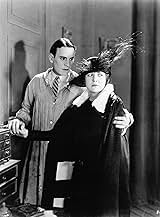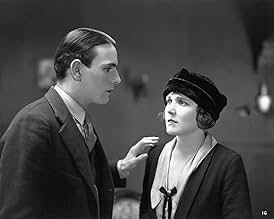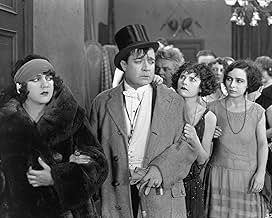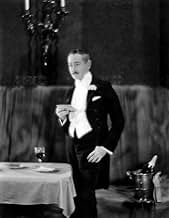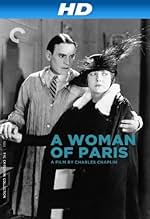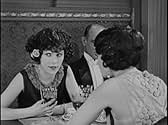AVALIAÇÃO DA IMDb
6,9/10
6,7 mil
SUA AVALIAÇÃO
Uma mulher sustentada pelo marido encontra seu ex-noivo e se vê dividida entre o amor e o conforto.Uma mulher sustentada pelo marido encontra seu ex-noivo e se vê dividida entre o amor e o conforto.Uma mulher sustentada pelo marido encontra seu ex-noivo e se vê dividida entre o amor e o conforto.
- Prêmios
- 3 vitórias no total
Charles K. French
- Jean's Father
- (as Charles French)
Nellie Bly Baker
- Masseuse
- (não creditado)
Henry Bergman
- Head Waiter
- (não creditado)
Charles Chaplin
- Station Porter
- (não creditado)
Frank Coghlan Jr.
- Boy
- (não creditado)
Antonio Corsi
- Accordion Player
- (não creditado)
Harry d'Abbadie d'Arrast
- Man in Nightclub
- (não creditado)
Stella De Lanti
- Revel's Fiancée
- (não confirmado)
- (não creditado)
Jean de Limur
- Man in Nightclub
- (não creditado)
Charles Farrell
- Man in Nightclub
- (não creditado)
Bess Flowers
- Mannequin
- (não creditado)
Avaliações em destaque
Fans of Charlie Chaplin flocked to the theaters anticipating a good laugh in his next film, September 1923's "A Woman In Paris." Despite a disclaimer in the beginning of the movie that this was a serious drama, viewers paying to see a comedy were dismayed and disappointed by it. But movie critics loved it, praising its subtleties and emotional depth. As writer David Robinson stated, "Chaplin inaugurated a whole new style of comedy of manners, and new styles of acting to suit it...by revealing the inner workings of his characters' hearts and minds through their external actions and expressions."
Chaplin felt that his regular comedic sidekick, Edna Purviance, who appeared in over 30 of his films since 1915, was becoming too mature of an actress to continue doing slapstick. He wanted to feature her in a serious, dramatic role to illustrate her expressive and sincere yet sober acting abilities. Gleaming a story idea from one of the country's most gold-digging of multi-millionaire wives, Peggy Hopkins Joyce, Chaplin formulated a story on a woman who leaves for Paris on a train after her supposed fiancee doesn't show up at the platform. Marie (Purviance) hooks up with a rich businessman, Pierre (Adolphe Menjou), and lives the life of luxury, until she meets up with her former fiancee. A suicide spices up Chaplin's plot, all derived from Joyce's own personal experiences. The comedian at the time was having a fling with this most interesting Virginian-born woman, Peggy Joyce, whose fangs dug into six very lucrative marriages. She was famous for quotes such as "True love was a heavy diamond bracelet, preferably one that arrived with its price tag intact."
Once the public realized the movie was all serious and lacked a Chaplin presence (he did have a short cameo as a train porter), the chairs in the theaters playing it became empty. Chaplin was forced to pull "A Woman In Paris" prematurely, which, being his first film for his co-ownershipped United Artists, hit the company's bottom line.
Chaplin's original desire to launch a new direction for Purviance fell flat. Not only was the film a failure at the box office, but a New Year's Day incident of 1924 involving a male friend put a crimp on her future acting ambitions. Attending an intimate gathering of three at oil magnate Courtland Dines' apartment with actress Mabel Normand, Purviance witnessed chauffeur Horace Greer (alias Joe Kelley) arrival to pick up Mabel. Conflicting accounts were given as to what happened next: either Greer saw something that hinted Dines being caught in the act with Mabel, or the host unexplicably approaching him angerly waving a wine bottle. Whatever happened, the chauffeur shot Dines three times. Purviance went to the wounded Dines assistance, and for the next 90 minutes tried to staunch the wounds in his bed. Greer drove to the police station to give himself up while the two actresses finally called an ambulance. With Dines refusing to testify during the trial, the jury came back with a not guilty verdict.
The scandal, with all the rumors filling in the blanks, basically slowed Purviance's career to a crawl. She was in one other Chaplin film, 'A Woman of the Sea,' which the unhappy director destroyed, and a 1927 French film. Her two uncredited parts in Chaplin's later movies were her swan songs of the secretary who turned into a movie actress. She received a small monthly salary from Chaplin for the remainder of her life. When she passed away in 1958 at 62, Chaplin, who appeared in over 30 movies with the actress, said "How could I forget Edna? She was with me when it all began."
Chaplin felt that his regular comedic sidekick, Edna Purviance, who appeared in over 30 of his films since 1915, was becoming too mature of an actress to continue doing slapstick. He wanted to feature her in a serious, dramatic role to illustrate her expressive and sincere yet sober acting abilities. Gleaming a story idea from one of the country's most gold-digging of multi-millionaire wives, Peggy Hopkins Joyce, Chaplin formulated a story on a woman who leaves for Paris on a train after her supposed fiancee doesn't show up at the platform. Marie (Purviance) hooks up with a rich businessman, Pierre (Adolphe Menjou), and lives the life of luxury, until she meets up with her former fiancee. A suicide spices up Chaplin's plot, all derived from Joyce's own personal experiences. The comedian at the time was having a fling with this most interesting Virginian-born woman, Peggy Joyce, whose fangs dug into six very lucrative marriages. She was famous for quotes such as "True love was a heavy diamond bracelet, preferably one that arrived with its price tag intact."
Once the public realized the movie was all serious and lacked a Chaplin presence (he did have a short cameo as a train porter), the chairs in the theaters playing it became empty. Chaplin was forced to pull "A Woman In Paris" prematurely, which, being his first film for his co-ownershipped United Artists, hit the company's bottom line.
Chaplin's original desire to launch a new direction for Purviance fell flat. Not only was the film a failure at the box office, but a New Year's Day incident of 1924 involving a male friend put a crimp on her future acting ambitions. Attending an intimate gathering of three at oil magnate Courtland Dines' apartment with actress Mabel Normand, Purviance witnessed chauffeur Horace Greer (alias Joe Kelley) arrival to pick up Mabel. Conflicting accounts were given as to what happened next: either Greer saw something that hinted Dines being caught in the act with Mabel, or the host unexplicably approaching him angerly waving a wine bottle. Whatever happened, the chauffeur shot Dines three times. Purviance went to the wounded Dines assistance, and for the next 90 minutes tried to staunch the wounds in his bed. Greer drove to the police station to give himself up while the two actresses finally called an ambulance. With Dines refusing to testify during the trial, the jury came back with a not guilty verdict.
The scandal, with all the rumors filling in the blanks, basically slowed Purviance's career to a crawl. She was in one other Chaplin film, 'A Woman of the Sea,' which the unhappy director destroyed, and a 1927 French film. Her two uncredited parts in Chaplin's later movies were her swan songs of the secretary who turned into a movie actress. She received a small monthly salary from Chaplin for the remainder of her life. When she passed away in 1958 at 62, Chaplin, who appeared in over 30 movies with the actress, said "How could I forget Edna? She was with me when it all began."
I was looking in Charlie Chaplin's memoirs and I found that his original idea for the plot of A Woman Of Paris came from pillow talk with Peggy Hopkins Joyce involving one of her former boyfriends, a French publisher. From this came Charlie's idea to direct, but not appear in a film and hopefully make his long time leading lady from slapstick comedy, Edna Purviance a major dramatic star.
The reason given for the non-success of A Woman of Paris is usually given as the fact that people bought tickets and were disappointed that they did not see a Charlie Chaplin comedy. Probably on the silent screen, star images were even more fixed in people's minds than they were when sound came in.
But seeing it today it really does go overboard into melodrama. Edna's a simple country girl who loves Carl Miller, a struggling artist. Some blind mischances of fate and she winds up the paid woman of Parisian rake Adolphe Menjou. It's the tragedy of one romantic and the salvation of sorts for the other that are the basis of the story.
You couldn't make a film like it today, audiences would just laugh at it. In 1923 audiences were looking for laughs attached to the Chaplin name and found none. Edna does a fine job, but the public would not accept her in a drama. Adolphe Menjou as the rake comes off best in the cast.
The film ironically enough was Chaplin's first for the newly formed United Artists of which he was a quarter interest partner. After this one failed at the box office, he went back to cranking out the comedies we expected from him.
Back when I was working person at New York State Crime Victims Board, I had a claimant named Wayne Purviance who was the victim of an anti-gay bias attack in 1982. It was a crime that galvanized the GLBT people of New York City, this person in particular. Wayne was the grand nephew of Edna Purviance.
He's no longer among the living, but to you Wayne Purviance who took some real blows for millions of people, this review is lovingly dedicated to you and your wonderful aunt.
The reason given for the non-success of A Woman of Paris is usually given as the fact that people bought tickets and were disappointed that they did not see a Charlie Chaplin comedy. Probably on the silent screen, star images were even more fixed in people's minds than they were when sound came in.
But seeing it today it really does go overboard into melodrama. Edna's a simple country girl who loves Carl Miller, a struggling artist. Some blind mischances of fate and she winds up the paid woman of Parisian rake Adolphe Menjou. It's the tragedy of one romantic and the salvation of sorts for the other that are the basis of the story.
You couldn't make a film like it today, audiences would just laugh at it. In 1923 audiences were looking for laughs attached to the Chaplin name and found none. Edna does a fine job, but the public would not accept her in a drama. Adolphe Menjou as the rake comes off best in the cast.
The film ironically enough was Chaplin's first for the newly formed United Artists of which he was a quarter interest partner. After this one failed at the box office, he went back to cranking out the comedies we expected from him.
Back when I was working person at New York State Crime Victims Board, I had a claimant named Wayne Purviance who was the victim of an anti-gay bias attack in 1982. It was a crime that galvanized the GLBT people of New York City, this person in particular. Wayne was the grand nephew of Edna Purviance.
He's no longer among the living, but to you Wayne Purviance who took some real blows for millions of people, this review is lovingly dedicated to you and your wonderful aunt.
If nothing else, you have to give Charlie Chaplin a lot of credit for taking a shot at something so different from his usual fare. (Though he himself only appears on-screen for a few seconds this time, he did almost everything else in the production.) And while "A Woman of Paris" is certainly a cut below his comedy features, it's a pretty good melodrama, and you'd have to think that with experience Chaplin could have gone on to become almost as effective with straight melodrama as he was with his sentimental comedies. It's not really surprising that after this he returned to comedy for good, but that was just to keep audiences happy, not because he couldn't do drama, since this is a decent effort.
Chaplin's own frequent lady Edna Purviance is convincing as the young woman whose tangled love affairs pull her away from her true love and into a set of tangled relationships in the empty, decadent world of the Parisian idle classes. Except for being rather contrived - there are far too many coincidences and pat developments in the plot, and they do not work as well in serious drama as they would in a comedy - the story is interesting and fairly creative. It does get a bit heavy at times, since there is very little comic relief, but Adolphe Menjou helps keep it from getting unbearably serious with a good performance as the carefree, irresponsible Pierre. He shows that even without dialogue he can make this kind of character lively and memorable.
Since it doesn't quite measure up to the standard of either the best Chaplin features or the best silent melodramas, "A Woman of Paris" may not have a niche of its own, except for its historical interest. But it's quite an interesting change of pace from Chaplin, and an above average movie that's worth seeing.
Chaplin's own frequent lady Edna Purviance is convincing as the young woman whose tangled love affairs pull her away from her true love and into a set of tangled relationships in the empty, decadent world of the Parisian idle classes. Except for being rather contrived - there are far too many coincidences and pat developments in the plot, and they do not work as well in serious drama as they would in a comedy - the story is interesting and fairly creative. It does get a bit heavy at times, since there is very little comic relief, but Adolphe Menjou helps keep it from getting unbearably serious with a good performance as the carefree, irresponsible Pierre. He shows that even without dialogue he can make this kind of character lively and memorable.
Since it doesn't quite measure up to the standard of either the best Chaplin features or the best silent melodramas, "A Woman of Paris" may not have a niche of its own, except for its historical interest. But it's quite an interesting change of pace from Chaplin, and an above average movie that's worth seeing.
'A Woman of Paris' is rather a curiosity in Charles Chaplin's filmography. It stands as the only pure drama he wrote and directed. The film he made just to help foster Edna Purviance's career independent from him. This film was Edna's first and practically the last leading role ('A Woman of the Sea' from 1926 was never released and is now considered to be lost), which, of course, is a pity, because besides being gorgeous, she was a fine actress, and was able to shine on her own not only as of the sidekick of The Tramp. The complex role Marie St. Clair proved that. The film itself was a failure at cinemas not because it was bad (critics at that time liked it), but because Chaplin wasn't in it (only for a brief cameo - a man carrying the box in the trainstation). And it was, oh the horror! a drama.
I guess that's the reason, why Chaplin never tried his hand at a serious movie ever again (although he experimented with quite risky stuff later in his career). That's another pity - because Chaplin truly knew how to create complex characters amid moral turmoils and dilemmas. 'A Woman of Paris' is undoubtedly with flaws. Well, it was practically Chaplin's second feature film and the first time where he ventured that far from his comfort zone.
Altogether, 'A Woman in Paris' is a good drama (probably a bit overly melodramatic by the end), and needs more recognition from Chaplin fans and all silent cinema admirers alike. It really shows that Chaplin was much more diverse and deep as a filmmaker than just offering magnificent laughs.
I guess that's the reason, why Chaplin never tried his hand at a serious movie ever again (although he experimented with quite risky stuff later in his career). That's another pity - because Chaplin truly knew how to create complex characters amid moral turmoils and dilemmas. 'A Woman of Paris' is undoubtedly with flaws. Well, it was practically Chaplin's second feature film and the first time where he ventured that far from his comfort zone.
Altogether, 'A Woman in Paris' is a good drama (probably a bit overly melodramatic by the end), and needs more recognition from Chaplin fans and all silent cinema admirers alike. It really shows that Chaplin was much more diverse and deep as a filmmaker than just offering magnificent laughs.
A melodrama rather than the saucy Parisian comedy the title and the name of Charles Chaplin suggests. Promptly withdrawn by its creator, 'A Woman of Paris' was for over half a century one of those films whose reputation was based upon it's unavailability for reappraisal and like many of Chaplin's later films was to prove a disappointment when it was finally revived in the 1970s.
Both the plot and the wardrobe worn by Chaplin's leading lady Edna Purviance evokes the era of Chaplin's fellow United Artist D. W. Griffith rather than the continental sophistication suggested by the title, while the presence of Adolphe Menjou happily anticipates the nascent sophistication of the twenties.
Both the plot and the wardrobe worn by Chaplin's leading lady Edna Purviance evokes the era of Chaplin's fellow United Artist D. W. Griffith rather than the continental sophistication suggested by the title, while the presence of Adolphe Menjou happily anticipates the nascent sophistication of the twenties.
Você sabia?
- CuriosidadesThe reissue of this film, with a musical score and new cut by Sir Charles Chaplin, was the last work of his entire film career. By then, the 87-year-old Chaplin was visibly frail but still walking. His score was aided by arranger Eric James, and he took a small theme from Monsieur Verdoux (1947), but most of the score was Chaplin's. The film was reissued posthumously in 1977 with the new score to overwhelming critical and public praise. At that time, many critics praised it (as in the trailer) as one of the best films ever made.
- Erros de gravaçãoWhen Jean starts fighting with Pierre in the restaurant, Pierre's glass of wine or champagne gets knocked over. When Pierre sits down on the table afterwards, the glass stands on the table filled with drink as if it hadn't been knocked over.
- Citações
[Intertitle]: Time heals, and experience teaches that the secret of happiness is in service to others.
- Versões alternativasDuring 1976, Chaplin was preparing a reissue of A Woman of Paris/Sunnyside but died before completion. The project was completed after his death, and the films were reissued in the United States by Kino International Corp. in 1978. This version, however, dispensed with an opening subtitle, as well as a few brief insert shots.
- ConexõesFeatured in Chaplin Today: Modern Times (2003)
Principais escolhas
Faça login para avaliar e ver a lista de recomendações personalizadas
- How long is A Woman of Paris: A Drama of Fate?Fornecido pela Alexa
Detalhes
- Data de lançamento
- País de origem
- Central de atendimento oficial
- Idioma
- Também conhecido como
- Una mujer de París
- Locações de filme
- Empresa de produção
- Consulte mais créditos da empresa na IMDbPro
Bilheteria
- Orçamento
- US$ 351.000 (estimativa)
- Faturamento bruto mundial
- US$ 12.921
- Tempo de duração
- 1 h 22 min(82 min)
- Mixagem de som
- Proporção
- 1.33 : 1
Contribua para esta página
Sugerir uma alteração ou adicionar conteúdo ausente

